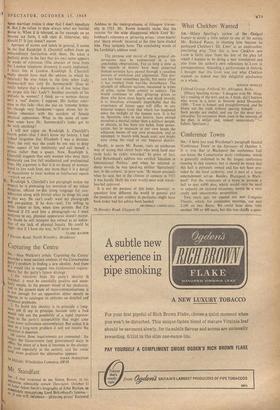Mr. Standfast
SIR'0,,, was surprised to see Simon Raven, in his othCrwise admirable review (Spectator, October 1)
ni ly
Janet Adam Smith's biography of John Buchan, so omisapplying Lord Birkenhead's famous— If You will, infamous—`glittering prizes' Rectorial Address to the undergraduates of Glasgow Univer- sity in 1923. Mr. Raven honestly states that the reasons for the wide disapproval which Lord Bir- kenhead's reference to 'glittering prizes,"stout hearts' and 'sharp swords' incurred at the time have eluded him. They certainly have. The concluding words of his Lordship's address read: The purpose and moral of these general ob- servations may be summarised in a few concluding observations. For as long a time as the records of history have been preserved human societies have passed through a ceaseless process of evolution and adjustment. This pro- cess has been sometimes pacific, but more often it has resulted from war-like disturbance. The strength of different nations, measured in terms of arms, varies from century to century. The world continues to offer glittering prizes to those who have stout hearts and sharp swords; it is. therefore, extremely improbable that the experience of future ages will differ in any material respect from that which has happened since the twilight of the human race. It is for us, therefore, who in our history, have proved ourselves a martial rather than a military people, to abstain, as has been our habit, from provo- cation. but to maintain in our own hands the adequate means of our own protection, and so equipped, to march with heads erect and bright eyes along the road of our Imperial destiny.
Hardly, to quote Mr. Raven, 'only an exuberant way of saying that clever boys who work hard may (with luck) be richly rewarded.' In point of fact, Lord Birkenhead's address was entitled 'Idealism in International Politics,' and when he referred to sharp swords he was speaking neither 'figuratively' nor, in the context, 'in poor taste.' He meant precisely what he said, but in the climate of opinion in 1923 it was hardly likely his view would meet with whole- hearted approval.
It is not the purpose of this letter, however, to speculate how different the world in general and the position of our country in particular might have been today had his advice been heeded.
ARCHIBALD CARMIC HAEL
26 Darnley Road, Glasgow SI






































 Previous page
Previous page